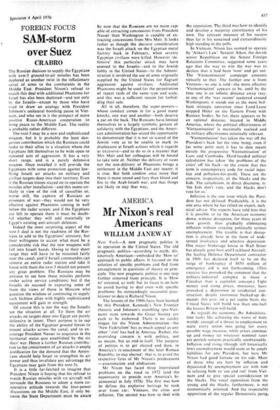FOREIGN FOCUS
SAM-storm over Suez
CRABRO
The Russian decision to supply the Egyptians with SAM-3 ground-to-air missiles has been deplored as another twist in the inflationary spiral of arms to the combatants in the Middle East. President Nixon's refusal to match this deal with additional Phantoms for Israel has also been deplored—and not only by the Israelis—except by those who have tried to draw an analogy with President Johnson's unilateral bombing pause in Viet- nam, and who see in it the prospect of more positive Russo-American cooperation to bring peace to the Middle East. The reality is probably rather different.
The sAM-3 may be a new and sophisticated weapon, but it is probably the least dan- gerous contribution which the Russians could make to their allies in a situation where the Egyptians felt themselves to be wide open to repeated acts of aggression. It has a very short range, and is a purely defensive weapon. Once installed it will provide the Egyptians with some protection against low- flying Israeli air attacks on military and civilian targets deep into their territory. Even if the Russian troops stayed on to operate the missiles after installation—and this seems un- likely in view of the risk of casualties or, worse still, the capture of Russians as prisoners of war—they would not be very effective against Phantoms coming in well below the radar screen; and if the Egyptians are left to operate them it must be doubt- ful whether they will add materially to Egypt's existing anti-aircraft defences.
Indeed the most surprising aspect of the sAM-3 deal is not the readiness of the Rus- sians to add to the Egyptians' armoury, but their willingness to accept what must be a considerable risk that the new weapons will fall into Israeli hands. Owing to their short range they will have to be mounted fairly near the canal; and if Israeli commandos can remove an entire radar station and take it home with them the sAM-3 should not present any great problem. The Russians may be anxious to see how these missiles perform under active service conditions; but if the Israelis do succeed in capturing some of them the views of those in Moscow who question the wisdom of continuing to supply such feckless allies with highly sophisticated equipment will gain in strength.
Of course this is not the way the Israelis see the situation at all. To them the air attacks on targets deep into Egypt are purely defensive in intent. Their purpose is to sap the ability of the Egyptian ground forces to mount attacks across the canal, and to en- courage President Nasser to acquiesce in the territorial status quo established by the six days' war. Hence a further Russian contribu- tion to the containment of air attacks is ample justification for the demand that the Ameri- cans should help Israel to strengthen its air power and thus invalidate any advantage the Egyptians may gain from the ssm-3s.
It is a little far-fetched to imagine that President Noon is hoping that his refusal to match Russian missiles with us aircraft will persuade the Russians to adopt a more co- operative attitude towards the four-power discussions on the Middle East, if only be- cause the State Department must be aware by now that the Russians are no more cap- able of extracting concessions from President Nasser than Washington is capable of ex- tracting concessions from Mrs Meir. It looks rather as though the decisive consideration was the Israeli attack on the Egyptian metal factory back in February, when seventy Egyptian civilians were killed. However 'de- fensive' this particular attack may have seemed to the Israelis—and to the Jewish lobby in the United States—to the Admini- stration it involved the use of arms originally supplied by the United States for flagrant aggression against civilians. Additional Phantoms might be used for the perpetration of repeat raids of the same type and scale, and this was a sufficient reason for forbid- ding their sale.
All in all, therefore, the super-powers- whose conduct comes in for a good many knocks, one way and another—both deserve a pat on the back. The Russians have limited themselves to a largely symbolic gesture of solidarity with the Egyptians, and the Ameri- can administration has seized the opportunity to demonstrate that it is not so scared of the Jewish vote as to be unable to mark its displeasure at Israeli actions which it regards as excessive—and to do so in a manner that Mrs Meir and her colleagues will be bound to take note of. Neither the delivery of SAMS nor the non-delivery of Phantoms brings a settlement in the Middle East any nearer, it is true. But both confirm once more that there is more sound and fury than blood and fire to the Arab-Israeli war, and that things are likely to stay that way,


































 Previous page
Previous page